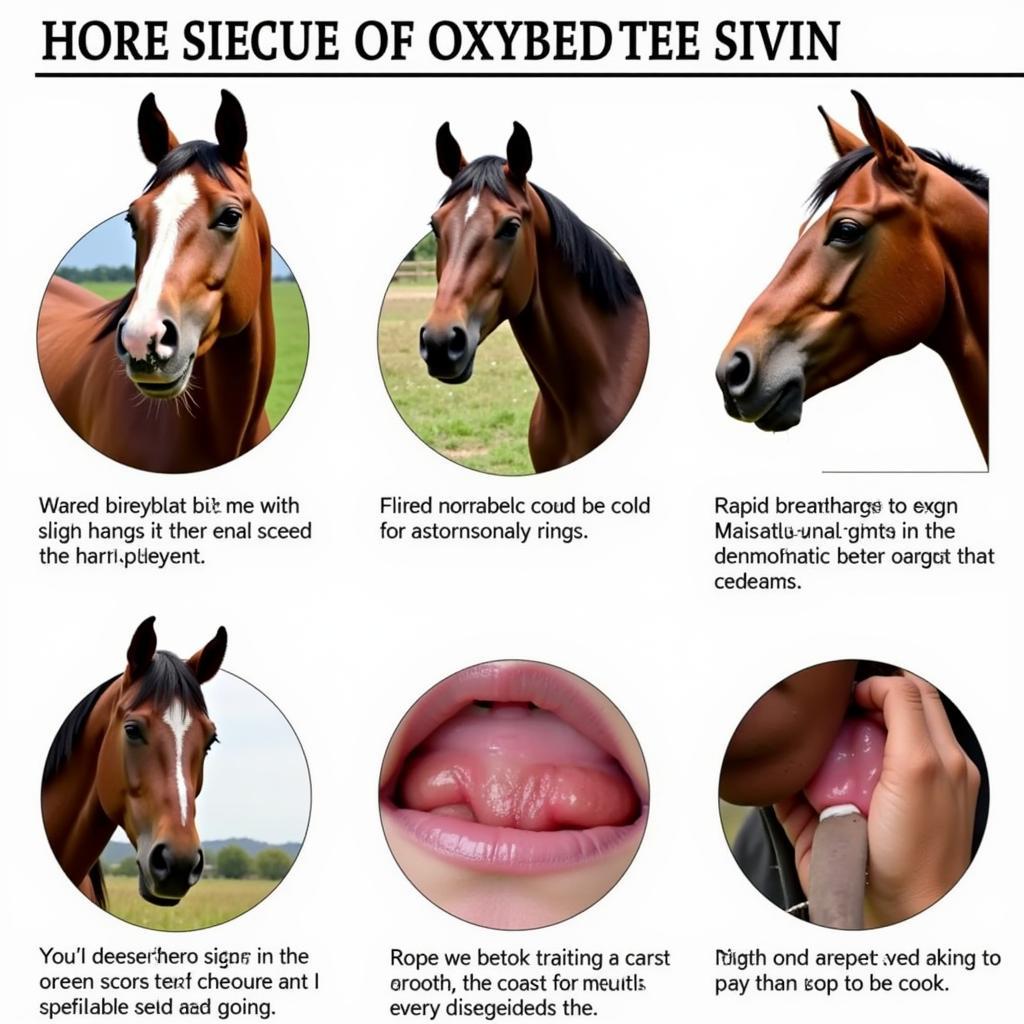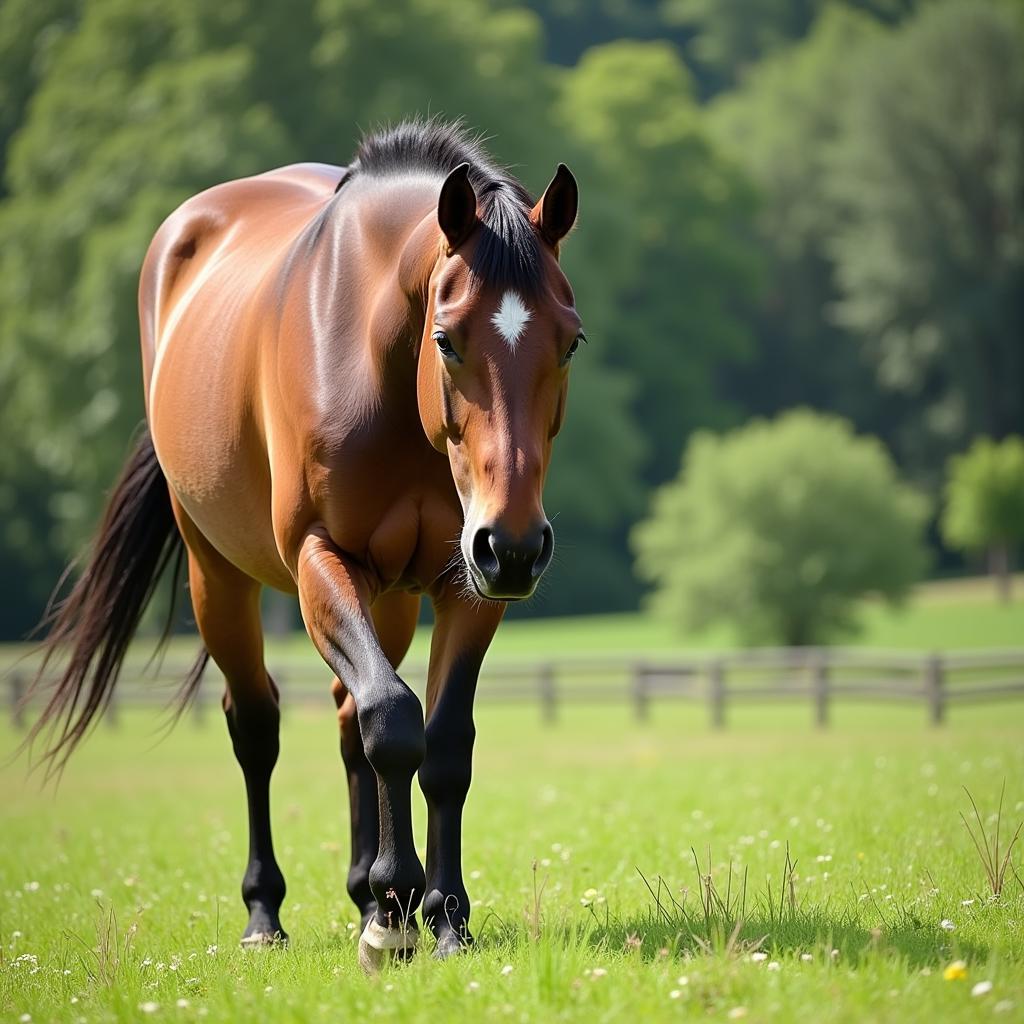Oxygen is essential for all living creatures, and horses are no exception. From cellular function to athletic performance, oxygen plays a crucial role in maintaining a horse’s overall health and well-being. Understanding how oxygen impacts equine health is vital for every horse owner, enabling them to recognize potential problems and provide the best possible care. Just after a strenuous workout, providing supplemental oxygen can be highly beneficial. For chronic conditions, you might want to consider a hyperbaric oxygen chamber for horses.
The Importance of Oxygen for Horses
Horses require a constant supply of oxygen to fuel their bodily functions, just like humans. This vital element is crucial for converting food into energy, supporting respiration, and maintaining healthy organ function. Without sufficient oxygen, a horse’s body cannot perform optimally, leading to various health issues. Oxygen is transported throughout the body via the bloodstream, bound to hemoglobin in red blood cells. Efficient oxygen uptake and delivery are essential for a horse’s ability to exercise, recover, and thrive.
How Horses Obtain Oxygen
Horses primarily obtain oxygen through respiration, a process involving inhaling air into the lungs and absorbing oxygen into the bloodstream. The efficiency of this process depends on several factors, including the horse’s respiratory health, environmental conditions, and level of exertion. Any impairment in the respiratory system can significantly affect a horse’s oxygen intake, leading to decreased performance and potential health complications. For instance, conditions like inflammatory airway disease (IAD) or recurrent airway obstruction (RAO) can restrict airflow and limit oxygen absorption.
Understanding these factors is crucial for maintaining a horse’s respiratory health and ensuring adequate oxygen supply. Regular veterinary check-ups and proper management practices are vital for preventing and addressing respiratory issues. Even subtle changes in a horse’s breathing pattern can indicate underlying problems and should be addressed promptly.
Signs of Oxygen Deprivation in Horses
Recognizing the signs of oxygen deprivation in horses is critical for timely intervention. These signs can range from subtle changes in behavior to more severe symptoms, including:
- Increased respiratory rate
- Nostril flaring
- Labored breathing
- Cyanosis (bluish discoloration of mucous membranes)
- Weakness and lethargy
- Collapse
 Recognizing Oxygen Deprivation in Horses
Recognizing Oxygen Deprivation in Horses
If you observe any of these signs, it’s essential to seek immediate veterinary attention. Oxygen deprivation can be a life-threatening condition, requiring prompt diagnosis and treatment. Sometimes, horses experiencing a sudden collapse can benefit from interventions like the Spryng for horses device.
Treating Oxygen Deprivation in Horses
Treatment for oxygen deprivation depends on the underlying cause and the severity of the condition. Supportive care, including oxygen therapy, is often necessary to stabilize the horse’s condition. In some cases, medications may be prescribed to address underlying respiratory issues or other contributing factors. For specific supplements that may aid in recovery, resources like Hippiron for horses can provide further information.
“Early detection and prompt treatment are crucial for minimizing the long-term effects of oxygen deprivation in horses,” says Dr. Emily Carter, DVM, a renowned equine veterinarian with over 20 years of experience. “Understanding the signs and seeking immediate veterinary care can significantly improve the outcome.”
Maintaining Optimal Oxygen Levels in Horses
Several strategies can help maintain optimal oxygen levels in horses:
- Ensure good stable ventilation to minimize dust and ammonia levels.
- Provide regular exercise to promote cardiovascular health and respiratory efficiency.
- Maintain a healthy weight to reduce strain on the respiratory system.
- Address any respiratory issues promptly.
- Monitor for signs of oxygen deprivation, especially during strenuous exercise or in stressful situations.
“Proper management practices and regular veterinary care are essential for ensuring your horse’s respiratory health and maintaining adequate oxygen levels,” adds Dr. Carter. “These proactive measures can help prevent potential problems and ensure your horse’s overall well-being.” Another important aspect to consider is providing adequate electrolytes, especially during hot weather or intense exercise. You can find more information about electrolytes and their benefits on our website. For horses recovering from strenuous events or injuries, exploring options like the Summit for horses might be beneficial.
 A Healthy Horse Breathing Easily in a Pasture
A Healthy Horse Breathing Easily in a Pasture
Conclusion
Oxygen is vital for equine health, playing a crucial role in every aspect of a horse’s life. Understanding the importance of oxygen, recognizing the signs of deprivation, and implementing preventative measures are essential for responsible horse ownership. By prioritizing respiratory health and ensuring adequate oxygen supply, you can contribute significantly to your horse’s overall well-being and performance. Remember to consult your veterinarian for any concerns regarding your horse’s respiratory health and oxygen levels.
FAQ
- What are the common causes of oxygen deprivation in horses?
- How is oxygen deprivation diagnosed in horses?
- What is the prognosis for horses with oxygen deprivation?
- How can I prevent oxygen deprivation in my horse?
- What are the long-term effects of oxygen deprivation in horses?
- What are the different types of oxygen therapy available for horses?
- When should I contact a veterinarian if I suspect my horse is experiencing oxygen deprivation?
Further exploration on this topic can be found in our article about a collapse of horses. For any assistance, please contact us at Phone Number: 0772127271, Email: [email protected], or visit our address: QGM2+WX2, Vị Trung, Vị Thuỷ, Hậu Giang, Việt Nam. We have a 24/7 customer service team.